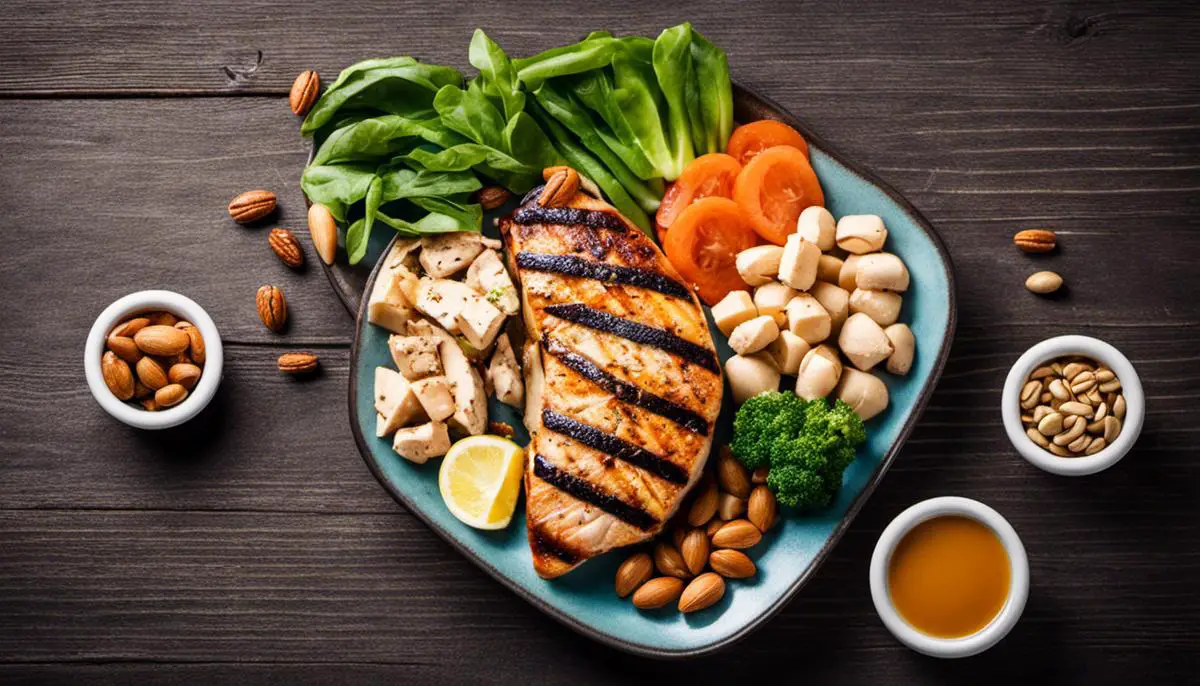When it comes to weight, most people focus on losing it. However, there are individuals who struggle with the opposite problem – gaining weight. While it may seem like an easy task to achieve, gaining weight in a healthy way requires a well-balanced and nutrient-rich diet. In this article, we will explore various foods that can help you gain weight quickly and safely. We will discuss the importance of carbohydrates, protein, dairy, and healthy fats in your diet, as well as provide tips for gaining weight during pregnancy and for toddlers.
Carbohydrates: Fueling Your Weight Gain
Carbohydrates, often referred to as carbs, are an essential nutrient that provides energy for our bodies. Including foods rich in whole carbohydrates in your diet is an effective way to gain weight. Here are some examples:
Rice
Rice is a high-carbohydrate food that can aid in weight gain. For instance, uncooked brown rice contains 76.7 grams of carbohydrates in a 100-gram serving, along with 368 calories. While both white and brown rice have some protein content, you can boost the protein intake by serving it with other foods such as meat or beans.
Whole Grain Bread
Whole grain bread is a great source of complex carbohydrates and higher in protein compared to white bread. To increase its caloric value, you can top it with protein-rich foods like nut butter or avocado. Additionally, you can prepare sandwiches with nutrient-dense ingredients for added calories.
Whole Grain Cereals
Whole grain cereals, such as oats, wheat, barley, and rice, can be mixed at home and served with milk or yogurt. Alternatively, you can opt for premixed cereals or cereal bars. It’s important to read the labels on these products as some may contain added sugars.
Dried Fruits
Dried fruits, such as dates and dried apricots, are a natural sweetener and can increase the calorie content of meals. You can sweeten cereals, yogurt, or smoothies with dried fruits. They can also be added to salads and cooked meals for an extra calorie boost.
Dark Chocolate
Dark chocolate, with a higher cocoa content, contains fewer sugars and more antioxidants compared to milk chocolate. Adding cacao powder or nibs to dishes can enhance flavor and calorie intake.
Other Starches
Incorporating other sources of carbohydrates into your diet can aid in weight gain. Potatoes, pasta, sweet potatoes, squash, corn, and legumes (such as beans and chickpeas) are rich in glucose, which the body stores as glycogen, an important source of energy during exercise.
Protein: Building Blocks for Weight Gain
Adequate protein intake is crucial for muscle growth and maintenance, making it an essential component of a weight gain diet. Here are some protein-rich foods to consider:
Salmon
Salmon is not only a source of protein but also provides healthy fats, including omega-3 fatty acids that support brain and eye health.
Eggs
Eggs are high in protein and healthy fats. They also contain choline, a nutrient vital for brain health and fetal development.
Protein Shakes
Protein shakes can be a convenient way to increase protein intake, especially for those with a small appetite or who follow a vegetarian or vegan diet. It’s important to choose protein shakes low in added sugars and consult a dietitian for recommendations.
Protein Supplements
Protein supplements, such as protein bars and drinks, can be added to your diet to meet increased protein demands. These products can also help increase calorie intake, especially during pregnancy. Checking the nutritional labels will help you select the most suitable product for your needs.
Dairy: Nutrient-Dense and Calorie-Rich
Dairy products are not only calorie-dense but also contain beneficial nutrients like protein and calcium. Incorporating the following dairy options can aid in healthy weight gain:
Milk
Milk is a versatile choice that can be consumed on its own or used as an ingredient in various recipes. It provides a good balance of protein, carbohydrates, and fats, making it beneficial for weight gain.
Cheese
Cheese is a concentrated source of calories and nutrients, including protein and calcium. Adding cheese to meals or snacks can increase calorie intake.
Yogurt
Yogurt is rich in protein, calcium, and probiotics. Opt for full-fat or Greek yogurt for higher calorie content and pair it with dried fruits or nuts for added nutrition.
Full-Fat Dairy Products
Choosing full-fat versions of dairy products such as milk, cheese, and yogurt can significantly increase calorie intake. These products also provide essential nutrients that support overall health.
Healthy Fats: Boosting Calories and Nutrition
Including healthy fats in your diet is crucial for weight gain as they are more calorie-dense than carbohydrates and protein. Here are some examples of healthy fats to consider:
Avocado
Avocado is a nutrient-dense fruit that contains healthy monounsaturated fats. Adding avocado to sandwiches, salads, or smoothies can increase calorie intake.
Nut Butter
Nut butter, such as peanut butter or almond butter, is a delicious and calorie-rich spread. Enjoy it on toast, fruit, or incorporate it into recipes for added healthy fats.
Nuts and Seeds
Nuts and seeds, such as almonds, walnuts, chia seeds, and flaxseeds, are excellent sources of healthy fats and other essential nutrients. Snacking on them or adding them to meals can boost calorie intake.
Olive Oil
Using olive oil for cooking or as a salad dressing can increase calorie content while providing important antioxidants and healthy fats.
Coconut Milk
Coconut milk is a rich source of healthy fats and can be used as a dairy alternative in various recipes. It adds flavor and creaminess while contributing to healthy weight gain.
Gaining Weight During Pregnancy
Pregnancy is a crucial time when gaining weight is essential for the health of both the mother and the baby. Here are some tips to help you gain weight safely during pregnancy:
Eat Nutrient-Dense Foods
Focus on consuming nutrient-dense foods such as lean proteins, whole grains, fruits, vegetables, and dairy products. These foods provide the necessary nutrients for both you and your baby.
Increase Caloric Intake
During pregnancy, you may need to increase your caloric intake to support healthy weight gain. Consult with a healthcare professional or a registered dietitian to determine the appropriate caloric goals for your specific needs.
Snack Between Meals
Including snacks between meals can help increase your overall calorie intake. Opt for healthy snacks such as nuts, yogurt, or smoothies to provide additional nutrients.
Stay Hydrated
Drinking plenty of water throughout the day is important for overall health and can help with digestion and nutrient absorption. Aim for at least eight glasses of water daily.
Regular Prenatal Check-ups
Regular prenatal check-ups with your healthcare provider are crucial during pregnancy. They can monitor your weight gain and ensure that you and your baby are healthy.
Weight Gain for Toddlers: Balanced Nutrition is Key
Gaining weight is a normal part of a toddler’s growth and development. Here are some tips to ensure healthy weight gain for your toddler:
Balanced Meals
Provide balanced meals that include a variety of food groups, including fruits, vegetables, whole grains, lean proteins, and dairy products. This ensures that your toddler receives all the necessary nutrients for healthy growth.
Nutrient-Dense Snacks
Offer nutrient-dense snacks between meals to increase calorie intake. Examples include yogurt, cheese, nut butter, and fresh fruits.
Limit Sugary Beverages
Avoid giving sugary beverages such as soda or fruit juice to your toddler. These drinks can fill them up without providing adequate nutrition.
Encourage Physical Activity
Physical activity is important for toddlers’ overall health and development. Encourage active play and provide opportunities for movement to support healthy weight gain.
Conclusion
Gaining weight in a healthy way requires a well-planned and nutrient-rich diet. By incorporating foods rich in carbohydrates, protein, dairy, and healthy fats, you can achieve weight gain safely. Whether you are trying to gain weight for personal reasons, during pregnancy, or for your toddler, it’s essential to focus on balanced nutrition and consult with healthcare professionals or registered dietitians for personalized guidance. Remember, healthy weight gain takes time, so be patient and consistent in your approach.


